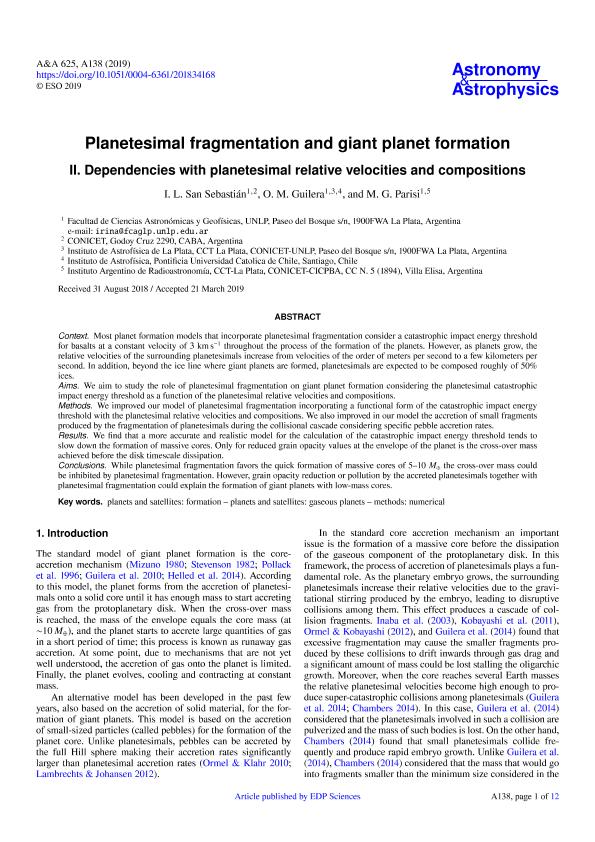Artículo
Planetesimal fragmentation and giant planet formation
Fecha de publicación:
05/2019
Editorial:
EDP Sciences
Revista:
Astronomy and Astrophysics
ISSN:
0004-6361
Idioma:
Inglés
Tipo de recurso:
Artículo publicado
Clasificación temática:
Resumen
Context. Most planet formation models that incorporate planetesimal fragmentation consider a catastrophic impact energy threshold for basalts at a constant velocity of 3 km/s throughout the process of the formation of the planets. However, as planets grow, the relative velocities of the surrounding planetesimals increase from velocities of the order of meters per second to a few kilometers per second. In addition, beyond the ice line where giant planets are formed, planetesimals are expected to be composed roughly of 50% ices.Aims. We aim to study the role of planetesimal fragmentation on giant planet formation considering the planetesimal catastrophic impact energy threshold as a function of the planetesimal relative velocities and compositions.Methods. We improved our model of planetesimal fragmentation incorporating a functional form of the catastrophic impact energythreshold with the planetesimal relative velocities and compositions. We also improved in our model the accretion of small fragments produced by the fragmentation of planetesimals during the collisional cascade considering specific pebble accretion rates.Results. We find that a more accurate and realistic model for the calculation of the catastrophic impact energy threshold tends toslow down the formation of massive cores. Only for reduced grain opacity values at the envelope of the planet is the cross-over massachieved before the disk timescale dissipation.Conclusions. While planetesimal fragmentation favors the quick formation of massive cores of 5?10 Earth masses the cross-over mass could be inhibited by planetesimal fragmentation. However, grain opacity reduction or pollution by the accreted planetesimals together with planetesimal fragmentation could explain the formation of giant planets with low-mass cores.
Archivos asociados
Licencia
Identificadores
Colecciones
Articulos(CCT - LA PLATA)
Articulos de CTRO.CIENTIFICO TECNOL.CONICET - LA PLATA
Articulos de CTRO.CIENTIFICO TECNOL.CONICET - LA PLATA
Citación
San Sebastián, Irina Luciana; Guilera, Octavio Miguel; Parisi, Mirta Gabriela; Planetesimal fragmentation and giant planet formation; EDP Sciences; Astronomy and Astrophysics; 625; 5-2019; 1-12
Compartir
Altmétricas




